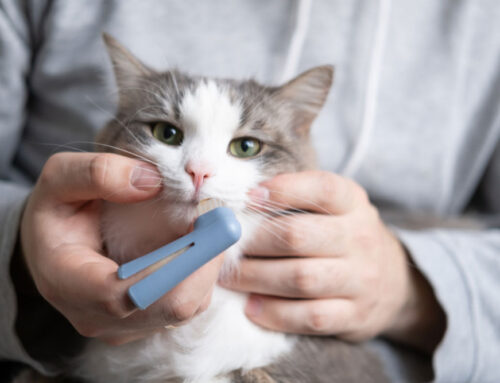“I need to bring my pet in for some vaccinations.” Our hospital’s client care specialists frequently hear some version of this sentence. It is easy to think that only vaccines are given during an appointment, but a good wellness visit is made up of many additional components. Viewing a preventive visit through the eyes of a veterinarian will present a new perspective on all that we do to keep your pet healthy.
Taking your pet’s history
This gives us a feel for changes since your pet’s last visit, and helps us catch any red flags. Your offhand remark about your old dog getting lazy is our signal to look closely at her heart, lungs, and joints. What you attribute to her picky eating may actually be a sign of dental disease or organ dysfunction. Anything out of the ordinary you observe about your pet is worth mentioning.
Performing a physical exam on your pet
A thorough nose-to-tail exam is critical for detecting abnormalities before they become a problem for your pet. All her body systems are evaluated for the following disease signs:
- Nose—discharge
- Eyes—uneven pupils, irritated areas, cloudy lens, or injured cornea
- Ears—discharge, redness, or masses
- Mouth—accumulated tartar, fractured teeth, improper bite, masses, or ulcers
- Lymph nodes—enlargement
- Skin—masses, parasites, redness, sores, or flakes
- Abdomen—pain, organ enlargement, or masses
- Heart—murmurs, abnormal rhythms, or improper rates
- Lungs—crackles or wheezes
- Limbs and spine—pain, swelling, or muscle atrophy
We will discuss any abnormal findings with you, document them carefully, and address problems with the indicated diagnostics or treatments.
Diagnostic tests for your pet
Your pet’s species, age, living situation, historical problems, and new abnormalities dictate the diagnostic tests we may recommend. Here are a few possibilities:
- Heartworm — A yearly test run on dogs to facilitate detection and treatment of heartworms before irreversible heart damage occurs
- FELV/FIV — A test to find feline leukemia virus (FELV) or feline immunodeficiency virus (FIV) infections in cats, so we can develop a lifelong management plan
- Chemical profile — A useful test to detect early organ dysfunction in senior pets, or to monitor pre-existing conditions
- Complete blood count (CBC) — A CBC gives a count of red and white cells, and platelets, to detect anemia, infection, or clotting problems
- T4 — A test of thyroid-hormone levels to diagnose or monitor treatment of thyroid disease
- Urinalysis — An evaluation of urine concentration, and screening for abnormal cells or components that indicate disease
- Fecal test — A fecal-sample test for diagnosis and treatment of internal parasites that compromise your pet’s health
Administering pet vaccinations
Vaccinations are a safe, effective way to protect your pet from diseases that may cause significant harm, and sometimes death, making them one of the most important preventive measures you can take for your pet. Based on vaccination principles and your pet’s lifestyle, we will recommend the vaccination types and schedules that best meet your pet’s needs. While buying vaccines at a feed store and administering them yourself may be tempting, this approach is not recommended, as improper storage or handling may render them ineffective.
Selecting parasite preventives for your pet
We consider the available products, your concerns, and your pet’s health and lifestyle to create the best plan for flea, tick, heartworm, or intestinal-parasite control. The preventive products in most pet stores range from ineffective to sometimes dangerous, whereas the veterinary products that we select and recommend specifically for your pet are a safer, superior option for preventing parasite-related diarrhea, weight loss, heart damage, skin irritation, or disease transmission.
A consultation about your pet’s behavior
Avoidance and management of behavior problems that impact your pet’s mental health and strain your bond are important, but less obvious, aspects of preventive care. With a new puppy we may discuss housebreaking, chewing, or socializing. Your pregnancy announcement means our tips to ease your pet’s transition to another human sibling. Mention of a cat urinating on clothes, or a dog showing separation anxiety, prompts digging deeper to propose solutions for your pet.
Nutrition counseling for your pet

The dietary options for your pet may seem endless, but your choices can have important implications for her health. Grain-free diets, or those with exotic ingredients, must be fed with caution, because they have been reported to be linked to dilated cardiomyopathy, a serious heart condition in dogs. Large-breed puppies on a free-choice puppy food may be at higher risk for orthopedic issues due to rapid growth. Home-cooked diets must be formulated properly to avoid nutritional deficiencies. We will use our knowledge to guard your pet’s health through proper food selection.
Are you surprised at the breadth of a wellness exam? It is so much more than giving vaccinations and selling parasite preventives. Contact us to get your pet on our schedule to ensure her healthy start to the New Year, and you will see our excellent veterinary team in action.








Leave A Comment